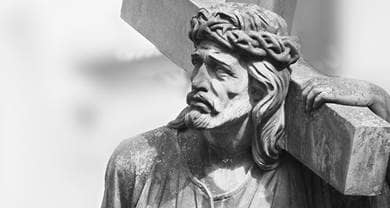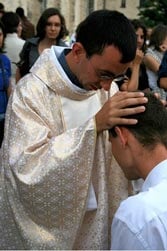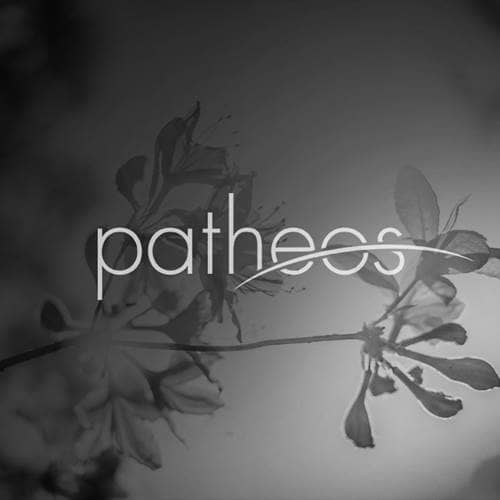- Trending:
- Olympics
- |
- Forgiveness
- |
- Resurrection
- |
- Joy
- |
- Afterlife
- |
- Trump

RELIGION LIBRARY
Christianity
Community Organization
 While the word "church" refers to a physical building where Christians gather, the society and fellowship of Christians is also called Church. In the Christian view, the Church is endowed with a profound spiritual reality. The New Testament texts contain a number of metaphorical references to the community of Christians as the flock, the vine and branches, or the olive tree, reflecting a belief in the Church as a living and organic body. In his letter to the Romans, Paul compares the Church to the organs and limbs of a body, and in his letter to the Ephesians he identifies Christians as members of the body of Christ, and of one another. Using descriptions drawn from the Old Testament, the first letter of Peter asserts this unity of the Christian community:
While the word "church" refers to a physical building where Christians gather, the society and fellowship of Christians is also called Church. In the Christian view, the Church is endowed with a profound spiritual reality. The New Testament texts contain a number of metaphorical references to the community of Christians as the flock, the vine and branches, or the olive tree, reflecting a belief in the Church as a living and organic body. In his letter to the Romans, Paul compares the Church to the organs and limbs of a body, and in his letter to the Ephesians he identifies Christians as members of the body of Christ, and of one another. Using descriptions drawn from the Old Testament, the first letter of Peter asserts this unity of the Christian community:
But you are a chosen people, a royal priesthood, a holy nation, a people belonging to God, that you may declare the praises of him who called you out of darkness into his wonderful light. Once you were not a people, but now you are the people of God... (1 Peter 2:9-10).
In the Christian view, the Church is catholic, meaning that it is universal, extending throughout the entire world and all of time, past, present, and future. To be the "people of God" is to be united in one family of God, despite denominational divisions or differences in language and nationality. When Paul called Christians "the body of Christ," he emphasized the oneness of the Church. Just as a person's body has many parts that work together as one, so the diverse communities of Christians are all called to work for the unity and health of the body of Christ (Romans 12:4-5).  God's presence is experienced when they gather to worship, their fellowship renewed just as on the day of Pentecost. Pentecost, described in the Acts of the Apostles, celebrates the birthday of the Church, when the followers of Jesus were transformed into a missionary community by the actions of the Holy Spirit and began to spread the new faith.
God's presence is experienced when they gather to worship, their fellowship renewed just as on the day of Pentecost. Pentecost, described in the Acts of the Apostles, celebrates the birthday of the Church, when the followers of Jesus were transformed into a missionary community by the actions of the Holy Spirit and began to spread the new faith.
The Acts of the Apostles and the letters of Paul concur that believers become members of the Church through the rite of baptism. Other New Testament texts, such as Titus 3:10, emphasize the importance of community cohesiveness, suggesting that a divisive person who offends the community should be shunned. The second letter of John warns people against letting heretics into their homes (2 John 1:10).
 The questions of heresy and schism have plagued the Church from the earliest days of the faith, when doctrinal debates over the true nature of Jesus and his relationship to God threatened to divide the Church. The most severe form of punishment for heresy is excommunication, in which the Christian is excluded from the sacraments, and, in very serious cases, prevented from attending Church services.
The questions of heresy and schism have plagued the Church from the earliest days of the faith, when doctrinal debates over the true nature of Jesus and his relationship to God threatened to divide the Church. The most severe form of punishment for heresy is excommunication, in which the Christian is excluded from the sacraments, and, in very serious cases, prevented from attending Church services.
Despite efforts to preserve the unity of the Church from the earliest days of Christianity, the Christian Church ultimately separated into two distinct churches:  the eastern Church, based in Constantinople, and the western Church, based in Rome, and later in the West, the Protestant churches. Geographical distance and different political and historical challenges gradually divided them and the split was formalized in 1054. Though Christian leaders made attempts to reunite, the Crusaders' decision in 1204 to divert their mission from Egypt to Constantinople and their pillaging of the city sealed the schism. The Muslim armies of the Ottoman dynasty conquered Constantinople in the 15th century, thus finally eliminating the possibility of reunification.
the eastern Church, based in Constantinople, and the western Church, based in Rome, and later in the West, the Protestant churches. Geographical distance and different political and historical challenges gradually divided them and the split was formalized in 1054. Though Christian leaders made attempts to reunite, the Crusaders' decision in 1204 to divert their mission from Egypt to Constantinople and their pillaging of the city sealed the schism. The Muslim armies of the Ottoman dynasty conquered Constantinople in the 15th century, thus finally eliminating the possibility of reunification.
| HEANicene CreedDER |
| We believe in one God,
the Father, the Almighty, maker of heaven and earth, of all that is seen and unseen. We believe in one Lord, Jesus Christ, the only Son of God, eternally begotten of the Father, God from God, Light from Light, true God from true God, begotten, not made, one in Being with the Father. Through him all things were made. For us and for our salvation he came down from heaven: by the power of the Holy Spirit he was born of the Virgin Mary, and became man. For our sake he was crucified under Pontius Pilate, he suffered, died, and was buried. On the third day he rose again in fulfillment of the Scriptures; he ascended into heaven and is seated at the right hand of the Father. He will come again in glory to judge the living and the dead, and his kingdom will have no end. We believe in the Holy Spirit, the Lord, the giver of life, who proceeds from the Father [and the Son]. With the Father and the Son he is worshiped and glorified. He has spoken through the Prophets. We believe in one holy catholic and apostolic Church. We acknowledge one baptism for the forgiveness of sins. We look for the resurrection of the dead and the life of the world to come. Amen. |
The western Church suffered a temporary schism between 1378 and 1417 when a dispute arose over papal succession and political influence. For a time, there was a pope in Rome and a pope in Avignon, France, and, for a while, even a third pope in Pisa, Italy. A century after this rift was healed, political struggles and corruption in the clergy contributed to the upheaval of the Protestant Reformation. The Reformation initiated the founding of several new streams of traditions and subsequently Christianity found itself divided into numerous denominations. While the Christian denominations have a great degree of difference in belief and practice, they generally agree on the doctrine of the Trinity, the Bible as scripture, and the teachings of the Nicene Creed.

The New Testament, and Jesus himself, places great importance on unity, and Christians are troubled by both ancient and modern divisions within the Church. Divergent views concerning baptism, ordination, and the doctrine of apostolic succession can provoke profound passions. These differences are discussed in the articles devoted to the different Christian traditions. Efforts at reconciliation, like those found in the ecumenical movement, have focused on commonalities of belief and practice between denominations, and there is hope that some major denominations will eventually agree to mutual recognition of baptism and ministry.  Although dedicated representatives of the major churches continue to work to build consensus, matters of considerable complexity and importance are at stake and progress toward reconciliation remains slow.
Although dedicated representatives of the major churches continue to work to build consensus, matters of considerable complexity and importance are at stake and progress toward reconciliation remains slow.
Study Questions:
1. What is the difference between the Catholic Church and the catholic church?
2. How does one become a member of a Christian church?
3. What is heresy? How is it punished?
4. How have schisms affected the organization of Christianity (as a whole)?










